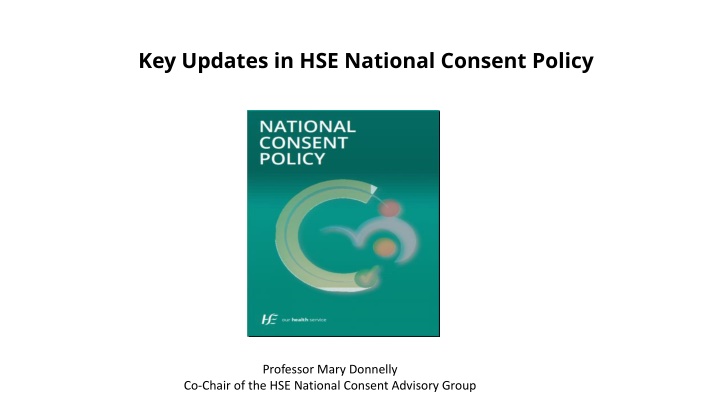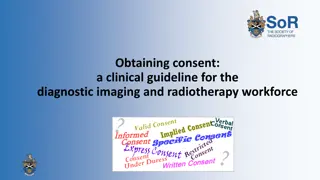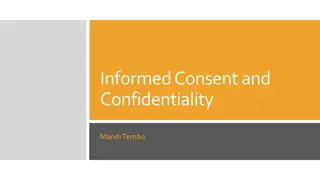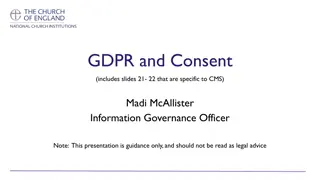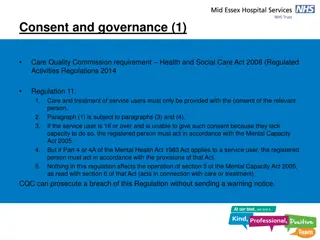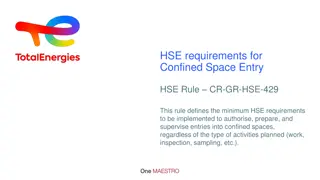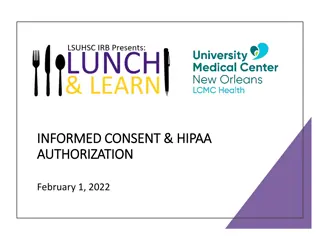Key Updates in HSE National Consent Policy
The HSE National Consent Policy is undergoing key updates to align with the Assisted Decision-Making (Capacity) Act 2015 and its amendments. The revisions include incorporating new legislation, enhancing clarity in information delivery, defining capacity to decide about interventions, and outlining support requirements. Stakeholder engagement and the inclusion of new templates and steering group members are among the notable changes.
Download Presentation

Please find below an Image/Link to download the presentation.
The content on the website is provided AS IS for your information and personal use only. It may not be sold, licensed, or shared on other websites without obtaining consent from the author.If you encounter any issues during the download, it is possible that the publisher has removed the file from their server.
You are allowed to download the files provided on this website for personal or commercial use, subject to the condition that they are used lawfully. All files are the property of their respective owners.
The content on the website is provided AS IS for your information and personal use only. It may not be sold, licensed, or shared on other websites without obtaining consent from the author.
E N D
Presentation Transcript
Key Updates in HSE National Consent Policy Professor Mary Donnelly Co-Chair of the HSE National Consent Advisory Group
Reason for Updates National Consent Policy 2022: In effect from March 2022 Drafted in light of the Assisted Decision-Making (Capacity) Act 2015 (ADM Act) Commencement of Assisted Decision-Making (Capacity) Act 2015 and Assisted Decision-Making (Capacity) (Amendment) Act 2022: 26 April 2023 Need to update Policy to take account of new legislation Engagement with key stakeholders including Office of Legal Affairs, Counsel, and State Claims Agency Incorporation of relevant aspects of Decision-Support Service Codes of Practice
Key Updates Introduction amended to include reference to new legislation Section 1.4 Removed Section 5.2 now includes Part One 3.3 from v1.1 New subsection 4.2 Part One Section 5 amended to incorporate ADM Act Part One, section 6 expanded to include where a person s capacity is in question and principles of ADM Part One, section 7 on Advance Directives amended to incorporate ADM Act Part One Section 8 change of title and update Appendices 3 new templates added, sequence changed, new membership of NCP Steering group 2023 included
New subsection 4.2 Greater clarity on how to make information more comprehensible Reflects ADM Act requirement that: A person is not to be regarded as unable to understand the information relevant to a decision if he or she is able to understand an explanation of it given to him or her in a way that is appropriate to his or her circumstances (whether using clear language, visual aids or any other means). Information should be tailored to individual s needs, including Plain English, diagrams, pictures, videos Concentrate on core information Break down information pause to see it is understood Avoid medical terminology and jargon
Key Updates to Section 5: Capacity to Decide about an Intervention Incorporation of ADM definition of capacity Inclusion of Guiding Principles from ADM Act Enhanced Support requirements Guidance on when a person s capacity should/should not be considered to be in question Guidance on when a capacity assessment should be conducted Inclusion of new requirements for the assessment of capacity Inclusion of new duty to support capacity
Some Key Points from Section 5 Capacity is decision and time specific The person should always be supported to make the decision before capacity assessment is considered In considering whether capacity assessment is necessary, consider what difference the assessment will make Ask is the intervention proposed is in accordance with the person s will and preferences and for the person s benefit Capacity assessment has defined steps and must be documented
Key Updates to Section 6: Making Decisions if a Person Lacks Capacity Incorporation of support requirements and support arrangements from ADM Act Incorporation of changes to Mental Health Act 2001 by ADM Act Guidance on the role of will and preferences and of benefit to the person Guidance where will and preferences are not ascertainable Guidance regarding when legal advice should be sought
Some Key Points from Section 6 In some circumstances, an intervention may be provided where a person lacks capacity and does not have a decision support arrangement under the ADM Act without the need for court approval. This is the case where: (1) The intervention is in accordance with the person s will and preferences (2) The intervention is in good faith and for the benefit of the person (3) Everyone who must be consulted under the ADM Act has agreed that the intervention should take place. If the person s will and preferences cannot be ascertained, the intervention may be provided if you have consulted with all who must be consulted under the ADM Act and also those close to the person and all agree that the intervention should take place.
Key Updates to Section 7: Advance Healthcare Plans and Advance Healthcare Directives Incorporation of the ADM Act requirements for Advance Healthcare Directives Statement of the duties of Healthcare in respect of Advance Healthcare Directives Guidance on how to assess the validity and the applicability of an Advance Healthcare Directive Guidance on the role of a Designated Healthcare Representative
Updates to Section 8: Deprivation of Liberty New Title Identification of role of application to High Court under inherent jurisdiction in Deprivation of Liberty cases
